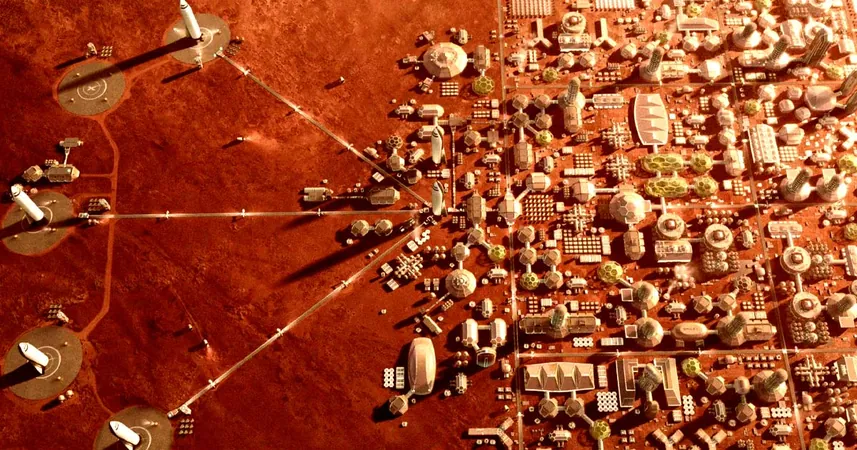
Elon Musk's Mars Colony Vision: A Dream or a Death Trap?
2024-11-30
Author: Ken Lee
Introduction
Elon Musk, the CEO of SpaceX, has consistently dazzled the world with his ambitious vision of making humanity a multi-planetary species. His flagship endeavor involves establishing a sustainable outpost on Mars, with a target of ferrying approximately one million settlers to the Red Planet by 2050 using the massive Starship rocket.
Concerns Over Musk's Vision
However, a closer examination of Musk's grand ambitions reveals a troubling reality. According to biologist Kelly Weinersmith and cartoonist Zach Weinersmith in their thoroughly researched book titled *A City on Mars: Can We Settle Space, Should We Settle Space, and Have We Really Thought This Through?*, the risks associated with colonizing Mars may far outweigh the benefits. They argue that these plans could swiftly descend into a catastrophic humanitarian crisis.
Ethical Considerations
In a recent interview with CNN, Kelly elaborated on their findings from four years of intensive research. "By the second year, we realized we were only scratching the surface of what we didn’t know," she admitted. She pointedly noted the ethical implications: "If we rush this, we risk creating an ethical disaster."
Health Risks of Colonization
One of the most alarming issues identified is the feasibility of human reproduction on Mars. Kelly expressed significant concern that attempting to scale up to millions of inhabitants could result in devastating health outcomes: "We could see dire consequences for mothers and infants, including increased mortality or cancer rates."
Exploration over Colonization
While the immediate prospects for Mars might not be suitable for permanent human life, Kelly highlighted the potential for research. "It is likely we could witness exploration missions to Mars within our lifetimes, but a sustainable human settlement capable of raising children there seems far-fetched," she stated.
Challenges of Living on Mars
The myriad challenges of colonizing Mars include exposure to high levels of space radiation and the effects of long-term microgravity on human bodies, particularly on reproductive health. The couple noted their surprise at the complexity of the issues they uncovered, such as the lack of data concerning adult functioning and reproduction in these harsh conditions.
Financial Viability and Earthly Distractions
These insights align with the cautions voiced by various experts who've critiqued Musk's colonization ambitions. Beyond the immediate challenges, there are questions of whether the mission would even be financially sustainable for Musk, the world's wealthiest individual.
Criticism from Public Figures
Moreover, critics like former President Barack Obama have called into question whether the focus on Mars colonization distracts from pressing crises here on Earth. Obama pointedly remarked that Earth might remain more hospitable than Mars, even in the face of severe environmental threats.
The Duality of Musk’s Vision
Musk’s vision for Mars is often framed in terms of excitement and adventure. "Not for the faint of heart," he has stated, acknowledging the risks those involved would face. Yet, the question remains: Is venturing to Mars truly a noble pursuit, or could it devolve into a perilous gamble that places countless lives at risk in pursuit of an uncertain dream?
Conclusion
As the conversation around Mars continues to evolve, one thing is clear: the idea of human life on another planet raises profound ethical and practical questions that we must carefully consider. Will we bravely press forward into the cosmos or retreat to find solutions to our Earthbound dilemmas? Only time will tell.
Final Thoughts
Stay tuned for updates on SpaceX's bold journey—and whether humanity's next chapter lies among the stars or back on our blue planet!


 Brasil (PT)
Brasil (PT)
 Canada (EN)
Canada (EN)
 Chile (ES)
Chile (ES)
 España (ES)
España (ES)
 France (FR)
France (FR)
 Hong Kong (EN)
Hong Kong (EN)
 Italia (IT)
Italia (IT)
 日本 (JA)
日本 (JA)
 Magyarország (HU)
Magyarország (HU)
 Norge (NO)
Norge (NO)
 Polska (PL)
Polska (PL)
 Schweiz (DE)
Schweiz (DE)
 Singapore (EN)
Singapore (EN)
 Sverige (SV)
Sverige (SV)
 Suomi (FI)
Suomi (FI)
 Türkiye (TR)
Türkiye (TR)